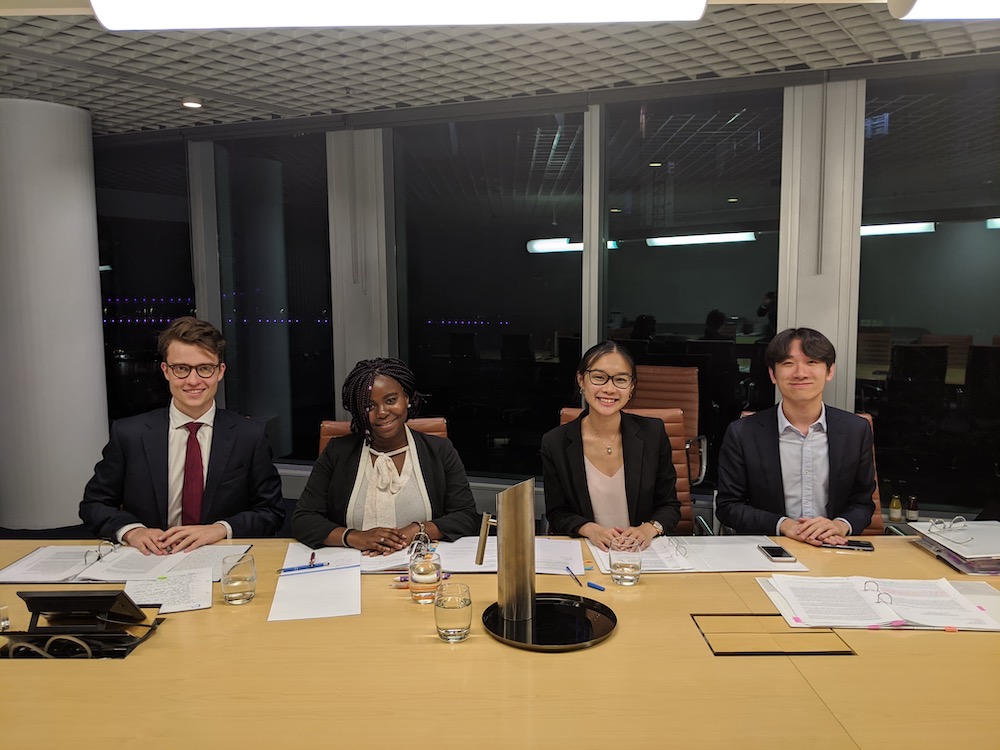Mooting, a centuries-old tradition dating back as early as the 1400s, is now a key skill and rite of passage for many undergraduate law students.
However, as COVID-19 rewrote the rulebook for daily life with working from home, studying from home and Zooming into meetings from the kitchen table becoming the ‘new normal’ for many - the pandemic also forced a break in tradition for mooting. This month, UQ competed in the first virtual Willem C. Vis International Arbitration Moot.
The team, consisting of Carmen Zhu, Elliot Perkins, Johnson Choi and Paivi Adeniyi, placed equal third out of a total of 260 teams in the moot, which is the best result for UQ in the oral rounds since winning in 2000 and placing second in 2002.

Academic Dean and Head of School Professor Patrick Parkinson said that this result cemented UQ Law’s reputation as one of the world's very best law schools for mooting at present.
“In the last three years, we have won the Jessup once, reached the quarter-finals the next year, and were due to compete again in Washington this year,” he said.
“We have won the international maritime law moot in two consecutive years and now have this success in the Vis.”
Fourth year Bachelor of Laws (Honours) student and team member Johnson said while many of the 2020 season international and domestic moots had been cancelled, there was a lot to be learned from the online format.
“Through videoconferencing platforms, we were able to see the opposing team and arbitrators all on one screen and could conduct our pleadings in a similar manner to those conducted physically,” he said.
“Social distancing restrictions pose logistical challenges in running these moots of course, but virtual moots present a valuable learning opportunity in online dispute resolution, a skill that will become increasingly necessary for young lawyers in the future.”
The move to a virtual moot in light of COVID-19 presented a number of challenges for the team, Paivi (Bachelor of Economics/Laws (Honours)) said, leaving them just two weeks to adapt their advocacy and master online delivery.
“The usual difficulty of communicating complex legal ideas to arbitrators from different legal backgrounds was compounded by the technical difficulties,” she said.
“One round had to be rescheduled because the platform’s servers crashed, sometimes arbitrators and competitors would get locked out of virtual conference rooms and of course, sometimes the audio and/or video would fail without warning.”
But the team remained flexible, not letting anything diminish their chances of success.
“Our focus was on improving our ability to communicate ideas clearly through an online medium and to remain personable and engaging even though we were not physically present,” Paivi said.
“This involved, for example, slowing down our speaking rate, varying our facial expressions and learning to focus on the camera instead of the computer screen to give the illusion of eye contact.”
One of the team’s two coaches Emily McClelland, who also coached the 2019 Vis team, said the team’s dedication was unwavering even when time zones meant competing until three in the morning.
“The team persevered through their tiredness and, to the credit of their professionalism, remained focused and enthusiastic,” she said.
“I am so proud of their hard work, performance and very well-deserved achievements.
“The Vis Moot creates an international community, and not even a global pandemic could prevent the connection between mooters from around the world, albeit in a different medium.”
Despite these uncertain times, Paivi also stressed just how valuable mooting has been, professionally and personally.
“Extracurricular mooting remains critically important, because it rounds out your legal education and equips you with the skills to succeed in the practice of law,” she said.
“It is not often in your law degree that you get to engage with legal issues in such a forensic and comprehensive manner.
“Personally, it has been very rewarding being able to condense six months of research and preparation into a finessed 14-minute speech.
“Most importantly, we have all become a tight-knit group of friends throughout this process. I know that we will all be supporting each other well into our legal careers.”
Carmen Zhu received an Honourable Mention in the award for Best Speaker in the general rounds.
In the written competition, the team received an Honourable Mention in the award for Best Respondent Memorandum.
Contact: BEL Communications, media@bel.uq.edu.au, +61 7 3346 9349.



